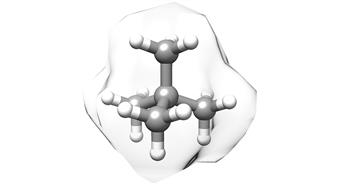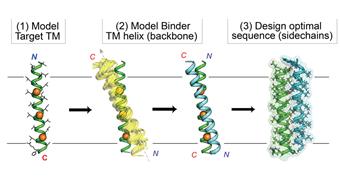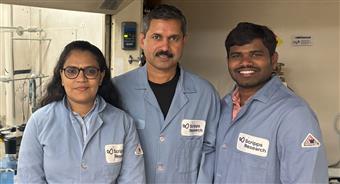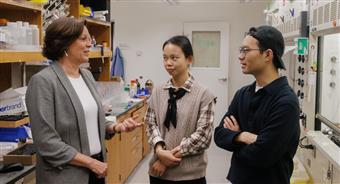
New strategy for treating common retinal diseases shows promise A potential treatment based on a natural protein may offer broader benefits than existing drugs.
October 27, 2020
LA JOLLA, CA Scientists at Scripps Research have uncovered a potential new strategy for treating eye diseases that affect millions of people around the world, often resulting in blindness.
Many serious eye diseases including age-related macular degeneration, diabetic retinopathy and related disorders of the retina feature abnormal overgrowth of new retinal blood vessel branches, which can lead to progressive loss of vision. It's a phenomenon called neovascularization.
For the past decade and a half, eye doctors have been treating these conditions with drugs that block a protein, VEGF, that's responsible for spurring new vessel growth. Such drugs have improved the treatment of these conditions, but don't always work well and have potential safety issues. The Scripps Research scientists, in a study published in the Proceedings of the National Academy of Sciences, showed that a new approach that doesn't target VEGF directly is highly effective in mice and has broader benefits than a standard VEGF-blocking treatment.
We were thrilled to see how well this worked in the animal model, says Rebecca Berlow, PhD, co-senior author of the study. There really is a need for another way to treat patients who do not respond well to anti-VEGF treatments.
Berlow is a staff scientist in the laboratory of Peter Wright, PhD, professor and Cecil H. and Ida M. Green Investigator in the Department of Integrative Structural and Computational Biology. The co-senior author on the study was Martin Friedlander, MD, PhD, professor in the Department of Molecular Medicine at Scripps Research, retina specialist and ophthalmologist in the Division of Ophthalmology at Scripps Clinic and President of the Lowy Medical Research Institute.
Ayumi Usui-Ouchi, MD, PhD, a post-doctoral fellow in Friedlander's laboratory and visiting assistant professor from the Department of Ophthalmology at Juntendo University in Tokyo, Japan, led the laboratory effort.
Our findings have important implications for treating these retinal diseases, Friedlander says.
New alternative to an imperfect solution
Vision-impairing neovascularization in the retina typically represents the body's faulty attempt to restore a blood supply that has been impaired by aging, diabetes, high blood cholesterol or other factors.
As the small vessels supplying the retina narrow or fail, oxygen levels in the retina decline. This low-oxygen condition, called hypoxia, is sensed by a protein called HIF-1 , which then triggers a complex hypoxic response. This response includes boosting production of the VEGF protein to bring more blood to areas in need. In principle, this is an adaptive, beneficial response. But chronic hypoxia leads to chronic and harmful blindness-causing overgrowth of abnormal, often leaky, new vessels.
Although anti-VEGF drugs stabilize or improve vision quality in most patients, about 40 percent are not significantly helped by these drugs. Moreover, researchers are concerned that the long-term blocking of VEGF, a growth factor needed for the health of many tissues including the retina, may do harm along with good. Many cases of retinal neovascularization are accompanied by the loss of tiny blood vessels elsewhere in the retina, and blocking VEGF inhibits or prevents the re-growth of these vessels.
In a 2017 paper in Nature, Berlow and colleagues described the workings of a different protein that naturally dials down the hypoxic response and thus might be the basis for an alternative treatment strategy. The protein, CITED2, is produced by HIF-1 as part of the hypoxic response, and apparently functions as a negative feedback regulator that blocks HIF-1 's ability to switch on hypoxic response genes keeping the response from becoming too strong or staying on too long.
A winning combination
For the new study, the team of researchers conducted tests in a mouse model of retinal hypoxia and neovascularization, using a fragment of CITED2 that contains its functional, hypoxic-response-blocking elements.
They showed that when a solution of the CITED2 fragment was injected into the eye, it lowered the activity of genes that are normally switched on by HIF-1 in retinal cells, and significantly reduced neovascularization. Moreover, it did so while preserving, or allowing to re-grow, the healthy capillaries in the retina that would otherwise have been destroyed researchers call it vaso-obliteration in this model of retinal disease.
In the same mouse model, the researchers tested a drug called aflibercept, a standard anti-VEGF treatment. It helped reduce neovascularization, but did not prevent the destruction of retinal capillaries. However, reducing the dose of aflibercept and combining it with the CITED2 fragment yielded better results than either alone, strongly reducing neovascularization while preserving and restoring retinal capillaries.
CITED2's ability to combine these two benefits appears to represent a key advance, the researchers conclude.
Most hypoxia-related retinal disorders, such as diabetic retinopathy, have extensive capillary loss in late stages of disease, leading to neuronal cell death and vision loss, Friedlander says. No current treatment has any therapeutic benefit for this aspect of the disorder.
The researchers now hope to develop the CITED2-based treatment further, with the ultimate goal of testing it in human clinical trials.
An allosteric peptide inhibitor of HIF-1 regulates hypoxia-induced retinal neovascularization was authored by Ayumi Usui-Ouchi, Edith Aguilar, Salome Murinello, Peter Wright, Rebecca Berlow, and Martin Friedlander, of Scripps Research; and by Mitchell Prins and Marin G
More from Scripps
12/04/2024
Scripps Research chemists devise easier new method for making a common type of building block for drugs Scientists transform simple linear amines into saturated...
06/04/2024
A simple, inexpensive way to make carbon atoms bind together A Scripps Research team uncovers a cost-effective method for producing quaternary carbon molecules,...
04/04/2024
Developing a vaccine for the zombie drug xylazine Scripps Research chemical biologists design an early proof-of-concept vaccine that could lead to the first...
30/03/2024
How blocking a neural receptor responsible for addiction could reduce alcohol use A Scripps Research team found that a new therapeutic that targets the kappa op...
13/03/2024
New computational strategy boosts the ability of drug designers to target proteins inside the membrane Customized-design approach could streamline the design of...
29/02/2024
Scripps Research scientists reveal how first cells could have formed on Earth New phospholipid discovery brings researchers closer to understanding how primordi...
29/02/2024
How molecular handedness emerged in early biology Scripps Research chemists fill a major gap in origin-of-life theories.
February 28, 2024
LA JOLLA, CA Mole...
22/02/2024
Snaking toward a universal antivenom Scripps Research scientists discovered antibodies that protect against a host of lethal snake venoms.
February 21, 2024
...
06/02/2024
Calibr-Skaggs announces expansion of option and license agreement with AbbVie to develop novel cell therapies for solid tumors and autoimmune diseases
AbbVie...
26/01/2024
Re-energizing mitochondria to treat Alzheimer's disease Scripps Research team restored neuron-to-neuron connections in human cells.
January 25, 2024
LA JO...
24/01/2024
100 years of Science Changing Life: Scripps Research celebrates a century of transforming human health For the last century, institute leaders and renowned scie...
23/01/2024
New technology lets researchers track brain cells' off switches The method could shed light on what goes awry in numerous brain conditions when neurons ar...
09/01/2024
Three decades of giving: Announcing the Calibr-Skaggs Institute for Innovative Medicines The ALSAM Foundation, founded by the Skaggs family, provides lasting g...
04/01/2024
Life science entrepreneur Gene Lay joins Scripps Research Board of Directors Lay, founder of the global biotech company BioLegend, brings invaluable experience ...
21/12/2023
Taming a plant-derived toxin Scripps Research team modifies the traditional poison picrotoxinin for potential neurological drugs and anti-parasite treatments. ...
19/12/2023
Scripps Research Executive Vice President Eric Topol gives TED talk on transformative power of AI in medicine Topol provides an overview of how AI models can i...
13/12/2023
New AI-powered algorithm could better assess people's risk of common heart condition Early detection of atrial fibrillation can reduce the risk of stroke an...
07/12/2023
Nanoparticle flu vaccine design shows promise in early tests Scripps Research-designed vaccine could provide broad, enduring protection against influenza A str...
16/11/2023
Numerous Scripps Research scientists named Highly Cited Researchers Clarivate's annual, global list represents researchers who have demonstrated significant...
07/11/2023
Multiple sclerosis drug invented at Scripps Research slows long-term devastating disease progression Late-breaking data reinforces the effectiveness and safety ...
05/10/2023
Keren Lasker named a 2023 Moore Inventor Fellow The prestigious award will support Lasker's inventive research in membraneless organelles and their applica...
22/09/2023
Michael Bollong named a 2023 Amgen Young Investigator The prestigious award will support Bollong's research identifying new molecular targets and therapeuti...
09/09/2023
Philip Dawson receives 2024 American Chemical Society National Award Dawson is honored with the Arthur C. Cope Late Careers Scholar Award for his foundational c...
07/09/2023
Scripps Research chemists devise a method for C-H activation of alcohols The method represents a new toolkit for making drugs and other compounds.
September 06...
31/08/2023
Scripps Research receives $1.5M to surveil infectious disease threats in wastewater Bill & Melinda Gates Foundation award to support the development of multi-pa...
16/08/2023
How cold temperatures trigger the brain to boost appetite Scripps Research scientists' discovery could lead to new weight loss and metabolic health treatmen...
08/08/2023
Human antibody that targets carfentanil, fentanyl and related opioids reverses overdose effects in preclinical study Scripps Research-developed antibody therapy...
04/08/2023
How sensory neurons impact the gut Scripps Research scientists show that the receptor PIEZO2 in sensory neurons controls gut motility and transit time, which a...
26/07/2023
AbbVie and Calibr Expand Strategic Collaboration to Advance Several Preclinical and Early-stage Clinical Assets The expanded strategic collaboration will advan...
23/07/2023
Scripps Research scientists develop AI-based tracking and early-warning system for viral pandemics Machine-learning system effectively predicts emergence of pro...
19/07/2023
Monitoring T cells may allow prevention of type 1 diabetes Scripps Research study shows that analyzing T cells in blood samples could be used to select at-risk ...
19/07/2023
Scripps Research mourns passing of leading organic chemist Albert Eschenmoser Eschenmoser pioneered key reactions in synthetic chemistry and shaped the understa...
15/06/2023
Scripps Research awarded $46.8 million by NIH to promote human health through innovative translational science and training The Translational Institute is harne...
13/06/2023
Scripps Research's Danielle Grotjahn named 2023 Pew Scholar in the Biomedical Sciences The award will support Grotjahn's study of how cells assemble the...
31/05/2023
Crossing the ring: new method enables C-H activation across saturated carbocycles Scripps Research chemists add another powerful tool to their molecular editin...
24/05/2023
Scripps Research develops behind-the-scenes tool for better biomedical data discovery The new resource makes datasets more discoverable for life science communi...
19/05/2023
Scripps Research neuroscientist Hollis Cline elected to American Academy of Arts and Sciences Cline is recognized for her discoveries about the role of sensory ...
19/05/2023
Scripps Research's Skaggs Graduate School awards doctoral degrees to 31st graduating class Commencement ceremony will be livestreamed via Zoom and on instit...
13/05/2023
A better route to benzocyclobutenes, sought-after building blocks for drugs Scripps Research chemists devise a new, C-H activation-based method for the synthesi...
09/05/2023
Renowned Scripps Research professor Jeffery Kelly elected to National Academy of Sciences Kelly's groundbreaking work on protein misfolding has led to thera...
28/04/2023
Mirror-image molecules pave new path for cancer drug discovery By comparing how mirror image versions of small molecules impact clusters of proteins, Scripps R...
22/04/2023
How alcohol consumption contributes to chronic pain A Scripps Research team showed how both alcohol intake and alcohol withdrawal can lead to increased pain and...
21/04/2023
Xin Jin receives dual awards to study autism risk genes in neurodevelopment Major grants from the National Institutes of Health and California Institute for Reg...
20/04/2023
Trim the sugar: New HIV vaccine design improves immune response Scripps Research vaccine candidate headed for clinical trials.
April 19, 2023
LA JOLLA, CA A...
18/04/2023
Therapeutic can seek and destroy potent opioid to treat overdoses Scripps Research chemists developed a new biologic to work against the synthetic opioid carfen...
07/03/2023
How heavy alcohol consumption increases brain inflammation The findings by a Scripps Research team point toward a potential new drug target for treating alcohol...
02/03/2023
Scientists find human antibodies that can block multiple coronaviruses including SARS-CoV-2 Results from a Scripps Research and UNC team pave the way for a vacc...
28/02/2023
$10 million grant funds Scripps Research Alcohol Research Center through its 50th year The five-year grant supports research into the neurobiology of alcohol us...
28/02/2023
Immune system drug shows promise in treating alcohol use disorder, a Scripps Research clinical trial reports Scientists at Scripps Research found that apremilas...
23/02/2023
Chemically poisoned protein acts as a molecular switch to spur cancer formation The discovery triggered development of a new potential drug to eliminate tumor...
 New strategy for treating common retinal diseases shows promise A potential treatment based on a natural protein may offer broader benefits than existing drugs.
New strategy for treating common retinal diseases shows promise A potential treatment based on a natural protein may offer broader benefits than existing drugs.
























